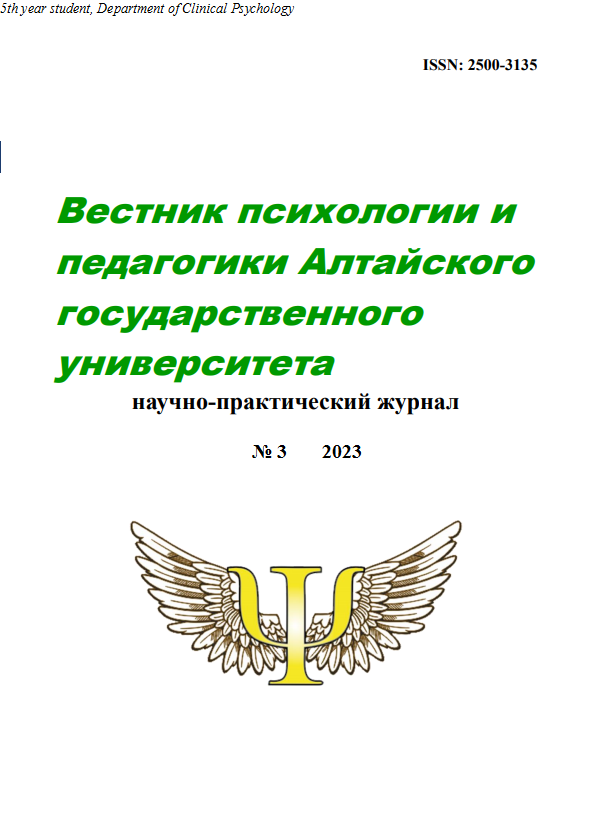COGNITIVE EMOTION REGULATION AND VALUE ORIENTATIONS OF PEDAGOGICAL UNIVERSITY STUDENTS
УДК 159.922
Abstract
The article discusses the concept of cognitive emotion regulation by N. Garnefsky and V. Kraig, the influence of cognitive emotion regulation on the adaptation (disadaptation) of the individual. The topical issue of studying the factors influencing the choice of one or another strategy of cognitive emotion regulation is raised. As one of these factors, the value orientations of the individual are considered. The paper presents the results of a study of the relationship between strategies for cognitive regulation of emotions and types of values among students of the Pedagogical University.
Downloads
References
Антилогова Л. Н. Ценностные ориентации и нравственная активность будущего педагога // Ценностно-смысловые ориентиры деятельности педагога в условиях цифрового общества : монография / под общей редакцией Н.В. Чекалевой. Омск : федеральное государственное бюджетное образовательное учреждение высшего профессионального образования "Омский государственный педагогический университет". 2022. С. 7–18
Карандашев В.Н. Методика Шварца для изучения ценностей личности: концепция и методическое руководство. СПб.: Речь, 2004. 70 с.
Ларионов П.М. Дисфункциональная когнитивная регуляция эмоций и тип поведения А как факторы риска психоэмоциональных нарушений // Известия Российского государственного педагогического университета им. А.И. Герцена. 2020. № 198. С. 140–154.
Лукашев А.И., Бычкова Е.А., Казлаукас Э., Крутолевич А.Н. Когнитивная регуляция эмоций и метакогнитивные убеждения во взаимосвязи с симптоматикой расстройства адаптации // Психосоциальная адаптация в трансформирующемся обществе: субъект-субъектная коммуникация как фактор социализации индивида : материалы V Международной научной конференции, Минск, 23–24 октября 2020 года. Минск: Белорусский государственный университет, 2020. С. 151–156.
Писарева О.Л. Когнтиивная регуляция эмоций // Актуальные психологические исследования. 2010. № 6. С. 64–68.
Первичко Е.А. Регуляция эмоций: клинико-психологический аспект. М.: Когито-центр, 2020. 363 с.
Яницкий М.С. Ценностные ориентации личности как динамическая система. Кемерово: Кузбассвузиздат, 2000. 203 с.
Extremera N. The Role of Cognitive Emotion Regulation Strategies on Problematic Smartphone Use: Comparison between Problematic and Non-Problematic Adolescent Users // International Journal of Environmental Research and Public Health. 2019. Vol 16(17). P. 43–51.
Garnefski N. Kraaij V., Spinhoven Ph. Negative life events, cognitive emotionregulation and emotional problems // Personality and Individual Differences. 2001. Vol. 30. P. 1311–1327.
Mahdi N. The Role of Impulsivity and Cognitive Emotion Regulation in the Tendency Toward Addiction in Male Students // Addictive Disorders & Their Treatment. 2021. V. 20. Р. 278–287.
References:
Antilogova L. N. Cennostnye orientacii i nravstvennaja aktivnost' budushhego pedagoga // Cennostno-smyslovye orientiry dejatel'nosti pedagoga v uslovijah cifrovogo obshhestva : monografija / pod obshhej redakciej N.V. Chekalevoj. Omsk : federal'noe gosudarstvennoe bjudzhetnoe obrazovatel'noe uchrezhdenie vysshego professional'nogo obrazovanija "Omskij gosudarstvennyj pedagogicheskij universitet". 2022. P. 7–18
Karandashev V.N. Metodika Shvarca dlja izuchenija cennostej lichnosti: koncepcija i metodicheskoe rukovodstvo. SPb.: Rech', 2004. 70 p.
Larionov P.M. Disfunkcional'naja kognitivnaja reguljacija jemocij i tip povedenija A kak faktory riska psihojemocional'nyh narushenij // Izvestija Rossijskogo gosudarstvennogo pedagogicheskogo universiteta im. A.I. Gercena. 2020. No 198. P. 140-154.
Lukashev A.I., Bychkova E.A., Kazlaukas Je., Krutolevich A.N. Kognitivnaja reguljacija jemocij i metakognitivnye ubezhdenija vo vzaimosvjazi s simptomatikoj rasstrojstva adaptacii // Psihosocial'naja adaptacija v transformirujushhemsja obshhestve: sub#ekt-sub#ektnaja kommunikacija kak faktor socializacii individa : materialy V Mezhdunarodnoj nauchnoj konferencii, Minsk, 23–24 oktjabrja 2020 goda. Minsk: Belorusskij gosudarstvennyj universitet, 2020. P. 151–156.
Pisareva O.L. Kogntiivnaja reguljacija jemocij // Aktual'nye psihologicheskie issledovanija. 2010. No 6. P. 64–68.
Pervichko E.A. Reguljacija jemocij: kliniko-psihologicheskij aspekt. Moskva: Kogito-centr, 2020. 363 p.
Janickij M.S. Cennostnye orientacii lichnosti kak dinamicheskaja sistema. Kemerovo: Kuzbassvuzizdat, 2000. 203 p.
Extremera N. The Role of Cognitive Emotion Regulation Strategies on Problematic Smartphone Use: Comparison between Problematic and Non-Problematic Adolescent Users // International Journal of Environmental Research and Public Health. 2019. Vol 16(17). P. 43–51.
Garnefski N. Kraaij V., Spinhoven Ph. Negative life events, cognitive emotionregulation and emotional problems // Personality and Individual Differences. 2001. Vol. 30. P. 1311–1327.
Mahdi N. The Role of Impulsivity and Cognitive Emotion Regulation in the Tendency Toward Addiction in Male Students // Addictive Disorders & Their Treatment. 2021. V. 20. Р. 278–287.
Bulletin of Psychology and Pedagogy of Altai State University is a golden publisher, as we allow self-archiving, but most importantly we are fully transparent about your rights.
Authors may present and discuss their findings ahead of publication: at scientific conferences, on preprint servers, in public databases, and in blogs, wikis, tweets, and other informal communication channels.
Bulletin of Psychology and Pedagogy of Altai State University allows authors to deposit manuscripts (currently under review or those for intended submission) in non-commercial, pre-print servers such as ArXiv.
Authors who publish with this journal agree to the following terms:
- Authors retain copyright and grant the journal right of first publication with the work simultaneously licensed under a Creative Commons Attribution License that allows others to share the work with an acknowledgement of the work's authorship and initial publication in this journal.
- Authors are able to enter into separate, additional contractual arrangements for the non-exclusive distribution of the journal's published version of the work (e.g., post it to an institutional repository or publish it in a book), with an acknowledgement of its initial publication in this journal.
- Authors are permitted and encouraged to post their work online (e.g., in institutional repositories or on their website) prior to and during the submission process, as it can lead to productive exchanges, as well as earlier and greater citation of published work (See The Effect of Open Access).







